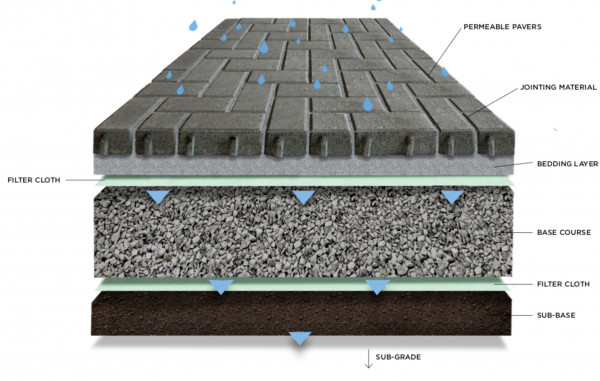While synonymous, the terms permeable, pervious and porous are quite different when it comes to discussing suitable pavement systems and their ability to offer the best environmental paving option.
It’s worth taking a look at the differences, and why choosing a permeable pavement system from Firth will give you everything you are looking for.
• The Latin root word for permeable (permeare) means capable of passing something like air or water.
• The Latin for pervious (pervius) means capable of accepting something like air or water.
• The Latin root word for porous (porus) means full of holes.
In New Zealand the different types of pavement that deal with stormwater are often referred to as permeable pavements, but it is important to note that there is a difference between them.
“There is a lot of talk about permeable paving but it’s important for people to understand the difference between a porous paver, where liquids can pass through the paver itself (Firth PorousPave), and then permeable paving systems (FlowPave and 300 x 300mm patio paver), which allow water to run through gaps around the paver and into the prepared system below,” Firth technical and specification advisor (masonry) Stuart Girvan says.
How it works:
Firth’s EcoPave range provides permeable paving solutions to assist stormwater management, reduce run-off and filter pollutants from the water.
The EcoPave system is made up of permeable or porous pavers overlaying a storage medium consisting of Firth EnviroMix concrete or a specifically designed drainage aggregate.
Geotextiles are used to separate the storage area from the bedding layer and the
sub-grade.
Together these elements create a highly functional system of permeability, without compromising aesthetics.
“While some pavers claim permeability when, in fact, they are porous, they lack the full system below, which is the real hero when it comes to dealing with stormwater run-off and filtering pollutants,” Mr Girvan says.
“The other very important factor is the cost difference.
“We offer permeable paving systems and porous pavers, but I would back the performance of our permeable paving systems, FlowPave and the Permeable Patio paver, over a porous paver any time.
“It’s just a better overall system that complies with all council requirements when a permeable system is stipulated.
“And now we have the more aesthetically pleasing Permeable Patio Paver system to add to the EcoPave range.
“Firth FlowPave has been in the New Zealand market for about 17 years, and in all that time it has had great success because of its durability, dependability and easy-care maintenance properties.
“Generally, permeable pavements are a relatively new concept in New Zealand, and the market continues to grow rapidly as regional authorities look for ‘at source’ stormwater controls to mitigate additional run-offs due to urbanisation.”




